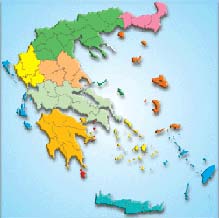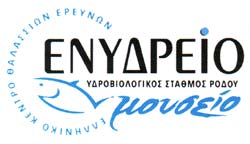
Please click on the map,
the region you want to visit |
|
|
|
|
| |
|
 |
Aquarium of Rhodes |
|
| |
Rhodes Aquarium
Hydrobiological Station of Rhodes
|
[Location:
Kos Str., Rhodes] |
|
 History History
The "Reale Istituto di Ricerche Biologiche di Rodi" (Royal Marine biology Institute of Rhodes) began to build in 1934 and it was completed after one year, after decision of the Italian Governor Mario Lago (the Dodecanese islands were under Italian occupation, 1912-43).
As its place of manufacture was fixed the northest point of island, at Akra of Miloi and is a work of the Italian architect Armando Bernabiti. |
| |
 His plan managed to combine elements of local architecture and Art Deco, which is characterized by curved lines and round windows, like the windows on ships, different levels with a central cylindrical tower, giving to the entire project a nautical aesthetic. His plan managed to combine elements of local architecture and Art Deco, which is characterized by curved lines and round windows, like the windows on ships, different levels with a central cylindrical tower, giving to the entire project a nautical aesthetic.
Special place holds the central entry with the particular decoration inspired from the animal marine environment.
The entire exterior of the building remained inalterable up to 1971-2, when was added the exhibition space of the museum and the tank for the seals on the northern side.
The building of the Hydrobiological Station of Rhodes has been declared as a historical monument and as a notable example of architecture of the "International Style" by the Ministry of Culture.
 The unique decoration of the runway of visitors is consisting of porous stones decorated with natural shells, depicting an underwater cave, and the special decoration of the floor with designs of marine organisms made by white and black pebbles, is giving to it another sense and they remain unchanging over the time. The unique decoration of the runway of visitors is consisting of porous stones decorated with natural shells, depicting an underwater cave, and the special decoration of the floor with designs of marine organisms made by white and black pebbles, is giving to it another sense and they remain unchanging over the time.
The operation of Institute began in 1937 with object the study of subjects of biology and hydrology of Aegean sea, the sponge issues, the fishing and the agronomy entomology. In its space had been installed also the first aquarium with samples from the marine fauna of Mediterranean.
After the incorporation of the Dodecanese islands in 1948 until 1963, the Institute continued operating under the supervision of the Academy of Athens as a regional branch of the Greek Hydrobiological Institute. After 1963 it functions as an Aquarium - Museum called Hydrobiological Station of Rhodes, forming also and a research unit of the Greek Center of Marine Research.
 Exhibits Exhibits
In the Aquarium, that was recently modernized, you will admire the tanks that exist along the corridor, the endemic samples of marine fauna and flora of the Aegean sea and Eastern Mediterranean, including species found in the southeast Aegean sea up to Red Sea.
The area you can visit is dedicated to the sea and includes 12 tanks, capacity from 1000 to 5000 liters, the central circular tank 25,000 liters and 15 small tanks from 50 to 100 liters, with the total volume of sea water, that is circulating in the plant, reaches the 75,000 liters. The ideal water quality is ensured by a circulation system "open type", by the continued renewal and by the minimal processing for better and more hygienic conditions of living.
GIZANI
 Emphasis has given on the particular presentation of Gizani (Ladigesocypris ghigii - Pisces, Cyprinidae), a small fish that lives only in fresh waters of Rhodes, that is considered as a small champion of survival because it accomplishes to live in a exceptionally difficult environment of streams of the island that during the winter they are flooding, while the summertime they become dry in big areas. Emphasis has given on the particular presentation of Gizani (Ladigesocypris ghigii - Pisces, Cyprinidae), a small fish that lives only in fresh waters of Rhodes, that is considered as a small champion of survival because it accomplishes to live in a exceptionally difficult environment of streams of the island that during the winter they are flooding, while the summertime they become dry in big areas.
Gizani is one of the endangered species of freshwater fish in Europe and is protected by European and Greek legislation. It is included also in the Red Book of Endangered Species of Greece.
It is hosted and presented at the Museum at a 1000-liter tank.
The Gizani is nourished by a big variety of wet nurses and it reproduced in large numbers during the spring and the summer, with a lifespan, in the wild, up to three years.
Apart from the Hydrobiological Station of Rhodes, which is actively involved in protecting of Gizani, have been created two more centers of protection and briefing in the limits of communities of Agia Eleousa and Psinthos.
Small kiosks have been built in these areas that accommodate an exhibition with information in printed form and electronic material, with regard to the uniqueness, biology, ecology and the need of the protection of species.
Near each of the kiosks, there are operating water tanks that maintain the small local populations of Gizani. The surrounding area has been landscaped for guests, with paths, benches, etc.
The three centers offer their services as information points and public awareness, and as controlled conditions of stock of Gizani. Visitors learn about Gizani and they can observe the fish which live in water tanks and thus contribute to the development of ecotourism and to public awareness of the need of protection of the environment and of this unique fish.
|
 |
CARE:
The whole effort of the Aquarium requires patient and daily work for the correct score administration of organisms (collection, transport, nutrition, conservation and presentation), and the inspection and maintenance of the technical installations from an important group of biologists, of fishery scientists and technologists, who they offer their best services to provide the overall result you will see and admire.
Significant attention and care is given to the preparation and distribution of food to organisms, which consume monthly a total of 130 kilos of food (squid, mussels, shrimp, octopus, small fishes and vegetable products).
|
|
Hydrobiological Station of Rhodes:
The mission of the Hydrobiological Station of Rhodes is the development and the dissemination of scientific knowledge on marine environment and its protection via the research, the development of expertise in the field of management of organizations in the aquarium, the study and the protection of aquatic organisms, the collection, the care and the reintegration at the wild of the aquatic animals, the education and the allotment of expert advice, the specialized training for students and the spread of knowledge for the sea.
At the Hydrobiological Station of Rhodes are implemented programs dealing with marine research in the Aegean and Mediterranean Sea, the study and the protection of the endangered marine species, the collection, treatment and reintegration at the wild of the aquatic animals at risk, the care and the reintegration of the aquatic animals at risk, the developing of the expertise in aquarioumology and the cooperation with Greek and international researching and educational institutions, Aquariums, Museums of Natural History, in order to exchange experience, practices and expertise on operational matters - improving of the facilities of the aquarium and of the showrooms and issues of common action to preserve and protect the marine environment and the endangered species. |
|
| |
|
INFORMATION:
Tel.: 22410.27.308, 22410.78.320, fax:
22410.78.321 |
Opening hours:
Wintertime: 1/11 - 31/3: 09.00 - 16.30 |
Summertime: 1/4 - 31/10: 09.00 - 20.30 |
|
|
|
|
|
|
|